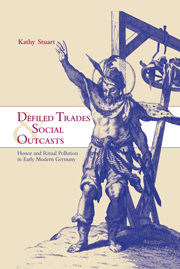Book contents
- Frontmatter
- Contents
- List of illustrations
- Acknowledgments
- List of abbreviations
- Glossary
- Introduction: defiled trades
- PART I THE MEANING OF DISHONOR IN EARLY MODERN SOCIETY
- 1 Medieval versus early modern dishonor
- 2 Honor, status, and pollution
- PART II THE DISHONORABLE MILIEU
- PART III PARADOXICAL DISHONOR: PUNISHMENT AND HEALING
- PART IV ARTISANAL HONOR AND URBAN POLITICS
- Conclusion: dishonor and the society of orders
- Selected bibliography
- Index
- CAMBRIDGE STUDIES IN EARLY MODERN HISTORY
2 - Honor, status, and pollution
Published online by Cambridge University Press: 06 August 2009
- Frontmatter
- Contents
- List of illustrations
- Acknowledgments
- List of abbreviations
- Glossary
- Introduction: defiled trades
- PART I THE MEANING OF DISHONOR IN EARLY MODERN SOCIETY
- 1 Medieval versus early modern dishonor
- 2 Honor, status, and pollution
- PART II THE DISHONORABLE MILIEU
- PART III PARADOXICAL DISHONOR: PUNISHMENT AND HEALING
- PART IV ARTISANAL HONOR AND URBAN POLITICS
- Conclusion: dishonor and the society of orders
- Selected bibliography
- Index
- CAMBRIDGE STUDIES IN EARLY MODERN HISTORY
Summary
Augsburg was one of the empire's major cities with a population of around 45,000 In 1600. Augsburg's status as a free imperial city had been firmly established since the early fourteenth century. As a sovereign state within the empire, Augsburg had developed an elaborate network of government bureaucracies that regulated life in the city. A brief consideration of Augsburg's constitutional and social structure will help place Unehrlichkeit in context. Augsburg's Stadtrecht, the civic code of 1276, mandated that the city council should include only the “best and wisest,” in other words councilors were to be of patrician estate. An exclusive caste of old families which had grown wealthy in long-distance trade, the patricians formed an urban nobility that jealously guarded its social and political privileges against rising artisanal classes and merchants who had grown rich more recently. The strict code of conduct that Augsburg patricians developed for themselves did not forbid them to engage in long-distance trade, as was the case in some other cities. But by the late middle ages they were for the most part living off income from country estates and were surpassed in economic vigor by new merchants. From the beginning, the patrician city council tried to block attempts by non-patricians to gain political representation by forbidding artisans to form sworn corporations. The civic code explicitly forbade the bakers to form guilds.
Merchants and wealthy artisans gained political power commensurate with their new economic standing in the guild revolt of 1368.
- Type
- Chapter
- Information
- Defiled Trades and Social OutcastsHonor and Ritual Pollution in Early Modern Germany, pp. 33 - 66Publisher: Cambridge University PressPrint publication year: 2000

